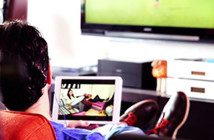This session, moderated by Ferhan Cook (left), yielded a panoply of useful app-building tips for those who knew how to cherry-pick.
New media commissioning manager Jen Topping of Channel 4 (second from left) kicked off with examples of promotional apps for the network’s prized shows.
Some of its objectives:
- To leverage on two-screen behaviour to drive more programme views. “Something like two out of three people in the US have got some device with them while watching television,” Topping said. “We really came to capitalise on that.”
- To create experiences on devices that people can enjoy away from the linear story cycle. “Things that are longer lasting and that have a different life expectancy or life cycle” – or behaviour, even from the show itself. At heart, the key is to keep as true as possible to the show, because that’s what people love, Topping said.The Jamie’s 30-Minute Meals app brings a practical spin to the show’s format: chef Jamie only cooks meals that take 30 minutes to make. The app is an egg timer shaped like Jamie’s head. “You’re supposed to use this, for free, in your kitchen when you’re cooking,” Topping explained.
It counts down from 30 minutes or less, and he talks to you the whole time. You can also tickle his face, which he doesn’t like. (He eventually bites.)
Two apps she described are due to go live in the next two weeks:
Come Dine with Me’s app includes recipes to draw from, a dinner party planner and choice soundbytes from Dave Lamb “to liven up a dinner party.”
Meanwhile, comedy program’s Peep Show app is merely a “very fun, disposable game related to the show.” You can access various character soundbytes by episode, with the option to download that episode from iTunes.
Managing director Dan Witters of KIWA Media UK (out of shot, sorry Dan!) lent more practical perspective to Topping’s colourful illustrations. His background is in media law, and he warns people against the hazards of launching a promotional app on the tail-end of existing campaigns or media spinoff efforts.
When a piece of content enjoys lots of fame, scoring itself a nice tidy film or TV deal, all is well. These slow steps to infamy are well-rehearsed in the traditional media world. But if it manages to score a second season of its show, maybe another movie, things start getting complicated.
After production’s done, the marketing team might go, “This is great, we should make an app!”
The typical promotional app chain typically starts with someone creating content (say, JK Rowling writing her first Harry Potter book) and ends with an app developer. But in between, there’s a tangled web of licensing deals that can complicate, even kill, this seemingly innocent idea. Lawyers start filing in, representing the author, the illustrator who says she never agreed for her work to appear in an app, the translators whose work, they suspect, may just get lifted if the app involves any kind of translating; and so on and so forth.
There’s a really simple solution to this problem: add apps to contracts early on, alongside potential TV, radio and other potential spinoff material, while the content is still being made.
“It’s just one more clause” among other traditionally foreseen eventualities, Witters said. And it’ll save you a lot of headaches.
Managing director Shaun Barriball of Mobile IQ (centre) gave us 10 lessons for app wisdom. Here’s just a handful:
- Select the right path. Remember your target market – what’s their device preference? Get the order right – launching cross platform takes work.
- Avert a design disaster. Tread carefully with in-house design, unless you have experience. “I’d always recommend getting involvement from touchscreen experts” as opposed to every person from any department who happens to own a phone and have an opinion. Design appropriately for brand and device.
- Make sure it’s sustainable. Getting v1 live is one thing – keeping it running is another. Support and maintenance takes time and money, factor this in.
And, rounding all this out, Cedric Thomas (right), Nokia France’s OVI manager, provided some helpful mobile app universe definitions: what an app store is, variations (Apple’s App Store, Android Store, Ovi Store, etc), the definition of a smartphone and a market overview.
He pointed out that target audiences usually have one or two specific standout OS’s that their using (the medical field, for example, is a dense BlackBerry forest). Recognise what suits your users, and plan accordingly.



